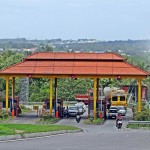The Union Cabinet Committee on Economic Affairs (CCEA) has approved a significant new railway project that will connect Manmad in Maharashtra to Indore in Madhya Pradesh. This 309-kilometre railway line, valued at Rs 18,036 crore, holds immense strategic and economic importance for India. The project, long in the making, is expected to bring a many benefits across various sectors, from agriculture and industry to tourism and employment.
Strategic Connectivity
One of the primary benefits of this railway line is its strategic connectivity. The project will link key agricultural districts in Uttar Pradesh, Madhya Pradesh, and Maharashtra with the Jawaharlal Nehru Port Authority (JNPA). This connection is important for facilitating the efficient transport of agricultural products, fertilisers, containers, and other commodities. By improving access to major ports, the railway line will enhance trade routes, reduce transit times, and contribute to the overall economic growth of the regions involved.
Boost to Tourism
The new railway line is expected to significantly boost tourism in the Ujjain–Indore region. The route will provide a shorter and more convenient connection between the Western and South-Western parts of India and Central India. This enhanced accessibility is likely to increase tourist footfall at key religious and cultural sites, including the famous Sri Mahakaleshwar Jyotirlinga Temple. The improved infrastructure will make it easier for pilgrims and tourists to visit these important landmarks, thereby supporting local economies and promoting cultural heritage.
Industrial Growth
The project is designed to meet the social and industrial needs of the region in alignment with the Pradhan Mantri GatiShakti framework. It will provide direct connectivity to the Pithampur Auto Cluster, which houses 90 large units and 700 small and medium industries. This direct access to the gateway port of JNPA and other state ports will streamline the transportation of goods, reduce logistics costs, and support the growth of industries in the region. The enhanced infrastructure will also attract new investments, fostering further industrial development and economic prosperity.
Agricultural Advantages
Agriculture stands to benefit greatly from this new railway line. The project will offer direct connectivity to the millet-producing districts of Madhya Pradesh and the onion-producing districts of Maharashtra. This connection will facilitate the efficient distribution of these agricultural products to both northern and southern parts of India. By improving the supply chain, the railway line will help stabilize prices, reduce wastage, and ensure that agricultural products reach markets in a timely manner.
Employment Generation
The construction of the railway line is expected to generate approximately 10.2 million man-days of employment. This is a significant boost for local economies, providing job opportunities for thousands of workers across six districts. The increased demand for labour will not only benefit individual workers and their families but also stimulate economic activity in the surrounding areas.
Environmental Impact
Besides its economic and social benefits, the railway project is environmentally friendly. The railways are a more energy-efficient and environmentally sustainable means of transportation compared to road transport. The project is expected to reduce oil imports by 18 crore litres and lower CO2 emissions by 138 crore kilograms, equivalent to the planting of 5.5 crore trees. This aligns with India’s climate goals and efforts to minimize the country’s carbon footprint.
The new Manmad-Indore railway line is a landmark project with far-reaching benefits. It will enhance connectivity, support industrial and agricultural growth, boost tourism, create jobs, and contribute to environmental sustainability. By addressing both social and economic needs, the project is set to play a pivotal role in the development of the regions it connects and in India’s broader economic progress.







